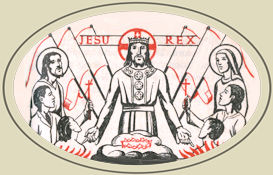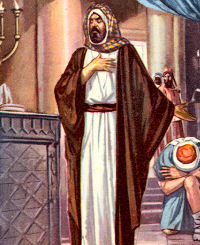» Enjoy our Liturgical Seasons series of e-books!
When the Pharisees heard that Jesus had silenced the Sadducees, they gathered together, and one of them, a scholar of the law tested him by asking, "Teacher, which commandment in the law is the greatest?" He said to him, "You shall love the Lord, your God, with all your heart, with all your soul, and with all your mind. This is the greatest and the first commandment. The second is like it: You shall love your neighbor as yourself. The whole law and the prophets depend on these two commandments" (Mt 22:34-40).
Click here for commentary on the readings in the Extraordinary Form of the Roman Rite.
Sunday Readings
The first reading is taken from the Book of Exodus 22:20-26. These verses cover the Israelites' duties toward strangers (non-Israelites), widows and orphans and the poor in general. They are a practical application of the law of charity in their dealings with their neighbors.
The second reading is from the first Letter of St. Paul to the Thessalonians 1:5c-10. St. Paul continues to praise the Thessalonians, not only for accepting the faith in difficult circumstances, but for the wonderful example their Christian life had already given to most of Greece.
The Gospel is from Matthew 22:34-40. The Pharisees may not have had evil intentions when asking Christ the question as to the greatest commandment. But they have done us a good service by getting this crystal clear answer from him. In this answer he tells us that the man who loves God and neighbor fulfills all his obligations, and carries out all the duties that God's self-revelation in "the law and the prophets" imposes on him. God revealed himself to us in the Old Testament as our Creator and divine benefactor. He had no need of us, since he is infinitely perfect in himself, but out of his infinite goodness he wished to share his eternal kingdom of happiness with mankind and so he created us. That we should love such a benefactor and be grateful to him is not asking much of us; such love should surely be the spontaneous reaction of a rational being, and yet there were and there are many who fail to acknowledge any such obligation.
No Christian, worthy of the name, can ever be among such thoughtless and thankless people. We have greater proofs of God's love for us than "the law and the prophets" gave to the Israelites. We have the added proofs of God's infinite interest in us brought to us by the Incarnation. We have been raised to the sublime status of adopted sons of God.
Where Christians can, and too often do fail, is in their true love of neighbor. Yet Christ says that this commandment is like the first. Love of neighbor is an essential part of our obligations toward God. If we fail in this we fail in our love for God, for we refuse to carry out this sacred duty. If we do not recognize our neighbor as our brother, we do not recognize God as our Father and we do not love him. As St. John puts it: "Anyone who says 'I love God' and hates (does not love) his neighbor is a liar" (1 Jn.3: 20).
Let each one of us ask himself today how seriously he takes this law of fraternal charity and how faithfully he carries it out. Not all of us may be able to give material help to a neighbor in need but the poorest of us can spare a kindly word, an encouraging word, for a neighbor weighed down with cares and troubles. All of us can pray for a neighbor who needs spiritual and temporal help. Most of us can deny ourselves some unnecessary luxuries in order to give a needed loaf of bread to a hungry fellowman, while those who have an abundance of this world's goods need not look far afield to find cases and causes worthy of their Christian charity.
Remember that whatever spiritual or material help is given out of true charity to a neighbor in need, is given to God, and whatever is given to God is soundly invested in heaven, and heaven pays handsome dividends.
-Excerpted from The Sunday Readings by Fr. Kevin O'Sullivan, O.F.M.
Commentary for the Readings in the Extraordinary Form:
Christ the King
 "He shall rule. . .unto the ends of the earth. . .All kings. . .shall adore Him, all nations shall serve Him"(Gradual).
"He shall rule. . .unto the ends of the earth. . .All kings. . .shall adore Him, all nations shall serve Him"(Gradual).
The "modern" man acts as "monarch of all he surveys" in the study of science, the enjoyment of pleasure, the worship of the State.
Yet we are not the creators of our resources but only the beneficiaries of the Creator. This Feast reaffirms that the wounds in the families of nations are caused by sin, namely, the abuse of these borrowed gifts; that all things (must be) restored in (Christ)" (Prayer).
Jesus alone has the right, well earned, as the Redeeming Lamb Who was slain (Introit), to be King over all the earth (Gradual); to be King of Truth in our minds (Gospel); to be King of our wills under the standard of His Law (Post-Communion); to be King of Love in our hearts (Epistle).
The Lord will bless His people with peace (Communion verse) only when they accept Him as King.
Excerpted from My Sunday Missal, Confraternity of the Precious Blood






